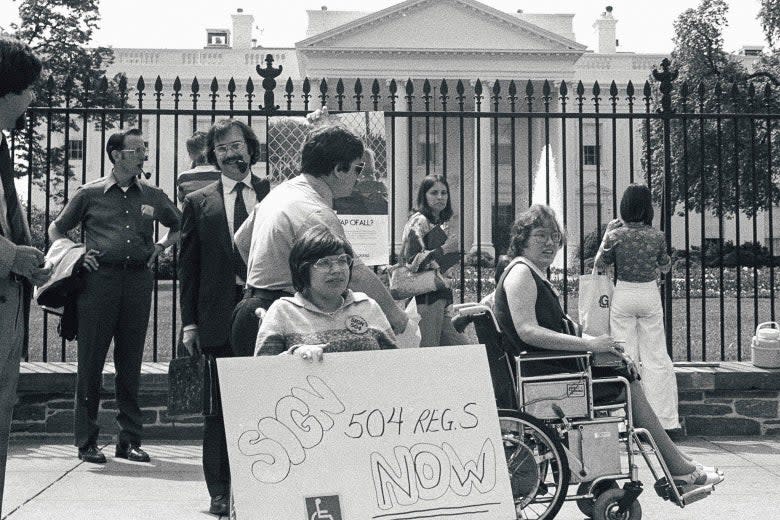'Crip Camp' directors on reclaiming title's derogatory term and celebrating monumental passing of Americans With Disabilities Act
This feature is part of the ADA 30th Anniversary series, which marks the 30th anniversary of the Americans With Disabilities Act — the civil rights legislation which prohibits discrimination based on disability, provides accommodations for employees with disabilities and requires public spaces to be accessible.
The term “crip,” short for “cripple,” has long been considered a derogatory term for people with disabilities. So it can be jarring to see Netflix touting a documentary called Crip Camp — even though the film has been hailed as an inspiring and enlightening look at a 1970s summer camp for disabled teens, many of whom went on to play pivotal roles in their fight for civil rights and the passage of the Americans With Disabilities Act of 1990, which celebrates its 30th anniversary on July 26.
“Not everybody likes this in the disabled community,” James LeBrecht, a camp attendee-turned-prolific sound designer who co-directed Crip Camp: A Disability Revolution with Nicole Newnham, admitted in a recent video chat with Yahoo Entertainment (watch above).
“But using the term ‘crip’ is a way to reclaim the word ‘cripple.’ And for us a lot of it is kind of shorthand, that if you use that in your language, that you are politically aware, you identify, culturally, as someone with a disability. Also, we wanted to make sure that the title really had this indication that the film was not your standard kind of sentimental, ‘Look at handicaps,’ but that that there was edge, there was something much more different going on.”
The documentary, which premiered to wide acclaim at the 2020 Sundance Film Festival and counts Barack Obama and Michelle Obama among its producers, essentially plays out in two parts. The first half looks at the wondrous environs of Camp Jened, a hippie-run upstate New York utopia for its attendees, who relished in the accepting community they found and tribe they formed. Campers had romantic flings, and not so surprisingly for a Woodstock-adjacent summer camp, smoked some grass. The film’s latter half follows many of them to San Francisco, where, led by the tireless activist Judith Heumann (a counselor at Jened), they held marches, staged sit-ins and took part in hunger strikes as they demanded equal rights for the disabled community in a fight for reform that ultimately moved to Washington, D.C.

“One of the wrongs we really wanted to right with this film was we wanted this story to take its rightful place in history,” says Newnham. “Most people don’t even know that there has been a disabled rights movement, to be honest, let alone they haven’t heard of Judy Heumann, one of the great civil rights heroes of our times. They don’t know that this change was brought by people with disabilities themselves.”
LeBrecht was a senior at the University of California San Diego when he started to see the effects of Section 504 of the Rehabilitation Act of 1973, which guaranteed certain rights to people with disabilities. “All of the sudden I was starting to see ramps put in and door handles changing and more accessible bathrooms. It really ignited the movement, and is really responsible for the organizing and the movement that lead to the passage of the Americans With Disabilities Act.”
The filmmaker becomes emotional when asked what he remembers about the day the ADA finally passed.
“It was a very, very monumental day,” he says. “I think there was a sense of relief, and tears.”
Crip Camp: A Disability Revolution is now streaming on Netflix.
Watch the filmmakers talk about ableism and how President Donald Trump was a recent victim of it:
— Video produced by Jon San
Read more on Yahoo Entertainment:


